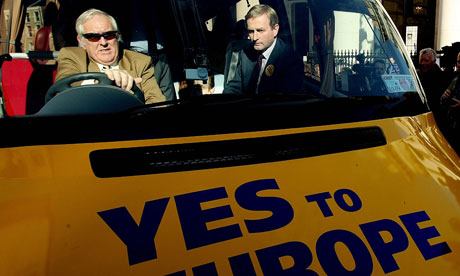http://www.guardian.co.uk/world/2012/apr/19/ireland-eu-fiscal-treaty-referendum

Irish voters undecided ahead of EU fiscal treaty referendum
Six weeks before Ireland's referendum on EU fiscal treaty, latest poll shows almost 40% have still to decide which way to vote

Enda Kenny, the Irish taoiseach, campaigns for a 'yes' vote in Ireland's last EU referendum. Photograph: Julien Behal/PA
A large number of Irish voters are undecided over a new EU treaty aimed at curbing nation states' excessive spending, according to an opinion poll.
With six weeks to go before Ireland votes on the EU fiscal treaty, an Irish Times Ipsos/MRBI polll has found that nearly 40% of voters have yet to decide which way to vote.
Ireland holds its latest referendum on the EU on 31 May and a "no" vote would not only signal a major setback for Enda Kenny's government, but could throw Brussels' plans for further fiscal reforms across Europe into fresh chaos.
The latest survey, published on Thursday, shows that 30% said they would vote "yes", 23% would vote "no", with 39% undecided and 8% saying they would not vote.
Since the last Irish Times poll on the issue in October, before the treaty was agreed, the "yes" vote is up two points, the "no" is down 24, and undecided and non-voters are up 22 points.
Treaty opponents will recall that the percentage of people who said they intended to vote "yes" to the Lisbon treaty in 2009 was even higher at the same stage. Irish voters ultimately rejected the treaty.
and......
http://www.irishtimes.com/newspaper/breaking/2012/0419/breaking1.html
The outcome of the European stability treaty referendum on May 31st is wide open, according to the latest Irish Times/Ipsos MRBI poll which shows the result is in the hands of undecided voters.
Asked whether they were likely to vote Yes or No to the treaty, 30 per cent of voters said Yes, 23 per cent said No, 39 per cent were undecided and 8 per cent said they would not vote. When undecided voters, and those who won’t vote, are excluded the Yes side is ahead by 58 per cent to 42 per cent but the outcome hinges on the attitude of the currently undecided voters.
A real worry for the Government is that at a similar stage in the first Lisbon Treaty referendum campaign in May 2008, the Yes side had a much bigger lead but the measure was rejected by the electorate in June of that year by 53 per cent to 47 per cent.
However, the Yes side can take heart from the fact that support for a No vote has halved since the last Irish Times poll in October, which asked people how they were likely to vote if EU leaders agreed on a treaty to deal with the fiscal crisis.
At that stage 28 per cent said they would vote Yes, 47 per cent No and 25 per cent were undecided.
The details of today’s poll show that the Yes campaign has strong backing from middle-class voters and farmers but working-class voters are opposed to it by a large margin.
There is also a significant gender difference, with men more supportive of the treaty, while almost half of women voters have yet to make up their minds.
The poll was taken on Monday and Tuesday of this week among a representative sample of 1,000 voters aged 18 and over, in face-to-face interviews at 100 sampling points in all 43 constituencies. The margin of error is plus or minus 3 per cent.
One encouraging finding for the Government’s Yes campaign is that Fine Gael voters strongly back the treaty with 54 per cent in favour, 9 per cent against and 34 per cent undecided.
Labour voters also favour the measure but are not as committed with 33 per cent in favour, 17 per cent against and 46 per cent undecided. Fianna Fáil voters are more solid in their support than Labour voters, with 41 per cent saying they will vote Yes, 20 per cent No and 36 per cent undecided.
The No side gets its core support from Sinn Féin voters and the supporters of Independents and smaller parties. Sinn Féin voters are strongly against the treaty, with 48 per cent intending to vote No, 12 per cent Yes and 33 per cent undecided.
Supporters of Independents and smaller parties are also against the treaty, although a large proportion of them are undecided, while Green Party voters are in favour by a margin of two to one.
An encouraging finding for the No side is that among committed voters Dublin is almost evenly split on the issue. The most pro-treaty region is Munster, while Connacht Ulster is the most against.
In age terms the strongest support for the treaty was among the over-65s, while the strongest support for the No campaign comes from the 50-64 age group.
Another poll finding is that a substantial majority of people believe Ireland will require a second bailout from the European Union and the International Monetary Fund. When asked if they believed Ireland would need a second bailout when the current aid package ends in 2014, 58 per cent said yes, 24 per cent said no and 18 per cent had no opinion.
Supporters of both Coalition parties expressed the view that a second bailout would be needed, despite statements by Taoiseach Enda Kenny and senior Ministers that they are working to ensure the country will not require a second programme.
There is still strong support for Ireland’s involvement in the EU, with 66 per cent of voters saying it was better to be part of the EU, 22 per cent said it was not and 12 per cent having no opinion.
In line with support for the stability treaty, pro-EU sentiment was strongest among best-off AB voters and farmers and weakest among the poorest DE voters, while men were more strongly in favour than women.
No comments:
Post a Comment